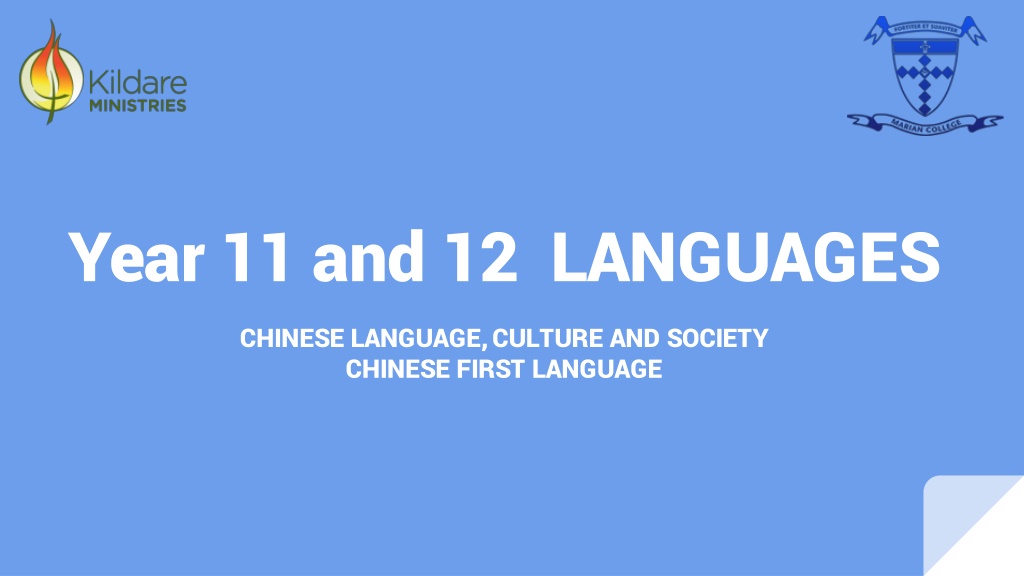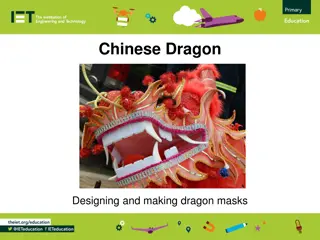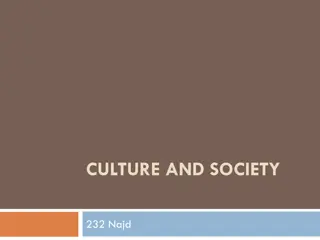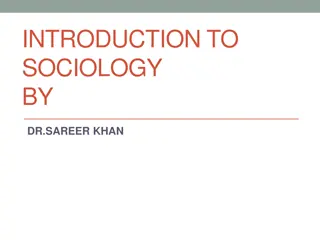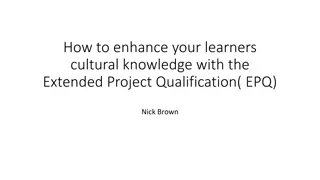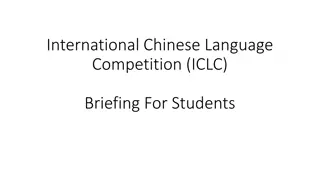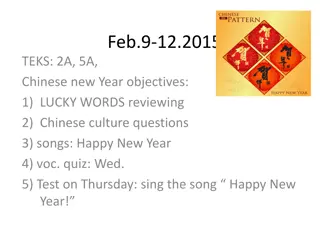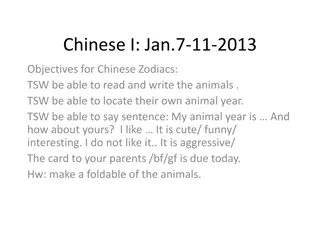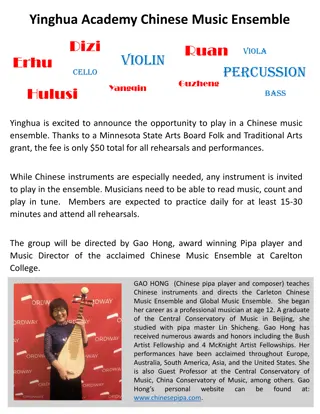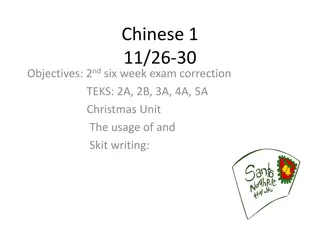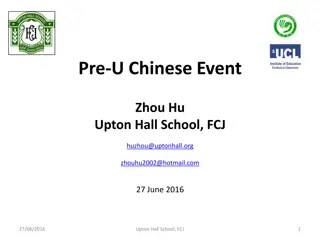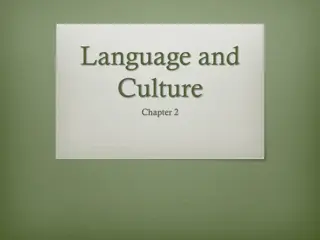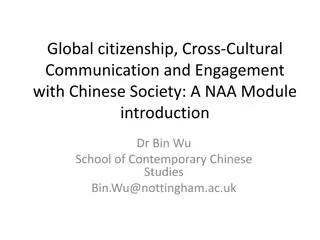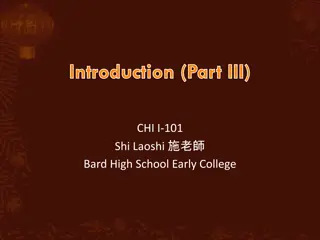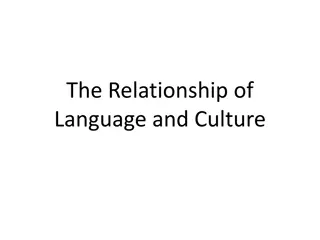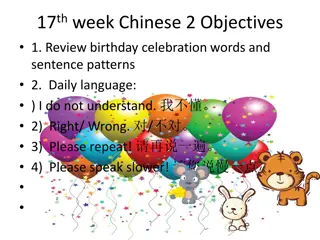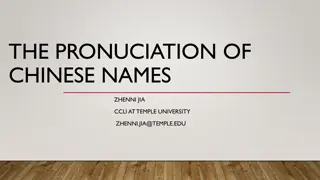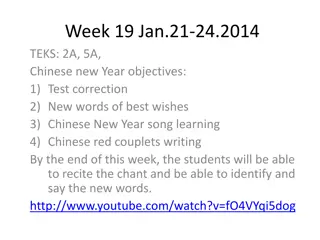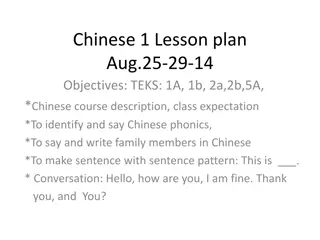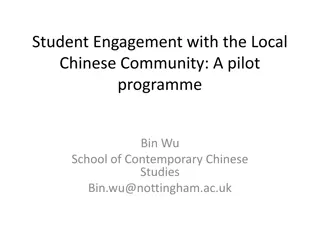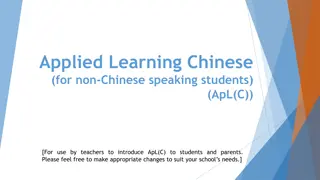Exploring Chinese Language, Culture, and Society in Years 11 and 12
Dive into the rich world of Chinese language, culture, and society in the Year 11 and 12 curriculum. Discover the significance of the Chinese language, its influence on global communication, and its role in various communities. Explore key aspects of modern China, including filial piety, generational changes, mythology, art, philosophy, and more. Enhance your communication skills in Mandarin, learn about cultural values, history, and social structures, and prepare for future studies and employment opportunities in diverse fields.
Download Presentation

Please find below an Image/Link to download the presentation.
The content on the website is provided AS IS for your information and personal use only. It may not be sold, licensed, or shared on other websites without obtaining consent from the author. Download presentation by click this link. If you encounter any issues during the download, it is possible that the publisher has removed the file from their server.
E N D
Presentation Transcript
Year 11 and 12 LANGUAGES CHINESE LANGUAGE, CULTURE AND SOCIETY CHINESE FIRST LANGUAGE
VCE Chinese Language, Culture and Society Rationale The Chinese language is spoken by about a quarter of the world s population. It is the major language of communication in China, Taiwan and Singapore, and is widely used by Chinese communities throughout the Asia Pacific region, including Australia. This study enables students to strengthen their communication skills in Modern Standard Chinese and to learn about aspects of the culture, history and social structures of Chinese- speaking communities through the medium of English. It also prepares students for further study and employment in areas such as tourism, technology, finance, services and business.
Unit 1 Chinese Language, Culture and Society In this unit students focus on important aspects of life in modern China. They explore the tradition of filial piety and examine and explore the impact of generational change in families. Students analyse the schooling system to consider and reflect on cultural values in China. They participate in discussions and analyse research about family and education in China. Students interact with other learners of the language and share information related to aspects of their personal world and life in Chinese-speaking communities. Students develop their reading and comprehension skills in Chinese and produce texts. They also exchange information using appropriate vocabulary and expressions.
Unit 2 Chinese Language, Culture and Society This unit focuses on the importance of myths, legends and Chinese art. Aspects of Chinese culture are explored through Chinese mythology as reflected through contemporary culture. Students undertake research related to, for example, mythology, legends and art. This unit also focuses on developing the students capacity to interact in spoken Chinese. Students develop their language skills by initiating, maintaining and closing an exchange. Tourism, geographical features and regional differences in China are considered. Students are given opportunities to write appropriately for context and situation.
Unit 3 Chinese Language, Culture and Society In this unit students investigate and examine significant and influential schools of thought throughout Chinese history and their impact on contemporary culture in China. Students explore and discuss in English the significance of Chinese philosophy and concepts related to contemporary Chinese culture and Chinese-speaking communities. Students present information on leisure in China using appropriate intonation, tones and stress with the appropriate vocabulary and expressions. Students produce simple texts using their knowledge to infer meaning from linguistic and contextual features of various sources.
Unit 4 Chinese Language, Culture and Society This unit focuses on an exploration of contemporary Chinese social values through aspects of change in China as well as through China s role in the global economy. Students investigate technological, social and political change in China. They reflect upon their own and others cultural values and further develop the capacity to interact with other speakers of the language. Information is also accessed through a range of spoken texts on the world of work and there is an emphasis on conveying meaning accurately in spoken Chinese. Students also further develop their writing skills in the area of future employment.
VCE Chinese First Language Units 1-4 This subject is designed for students who have spent time as a resident or who have significant experiences studying Chinese in a country in which Chinese is the major language of communication Students wishing to undertake this subject must discuss this with either Mrs Mansell or Ms Guan.
VCE Chinese For more information please contact: Mrs Stephanie Mansell Head of English and Languages smansell@mcararat.catholic.edu.au Ms Julia Guan 7-10 and VCE Chinese teacher jguan@mcararat.catholic.edu.au
